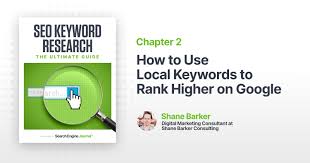Unlocking the Power of SEO Keyword Rank for Digital Success
The Importance of SEO Keyword Rank in Digital Marketing
In the realm of digital marketing, SEO keyword rank plays a crucial role in determining the visibility and success of a website. Understanding and utilising SEO keyword rank effectively can significantly impact a website’s search engine performance and ultimately its online presence.
What is SEO Keyword Rank?
SEO keyword rank refers to the position at which a particular webpage appears in the search engine results pages (SERPs) for a specific keyword or key phrase. The higher the ranking, the more likely it is that users will click on that link, driving organic traffic to the website.
Why is SEO Keyword Rank Important?
Having a high SEO keyword rank is essential for several reasons:
- Visibility: Websites that rank higher in search engine results are more visible to users, increasing the likelihood of attracting organic traffic.
- Credibility: Higher rankings are often associated with credibility and authority, instilling trust in users and potential customers.
- Traffic: Improved rankings lead to increased organic traffic, resulting in more opportunities for conversions and sales.
- Competitive Advantage: Outranking competitors for relevant keywords can give businesses a competitive edge in the digital landscape.
How to Improve SEO Keyword Rank
To enhance SEO keyword rank, consider implementing the following strategies:
- Keyword Research: Conduct thorough keyword research to identify relevant keywords with high search volumes and low competition.
- On-Page Optimisation: Optimise webpage content, meta tags, headings, and URLs with targeted keywords to improve relevance and visibility.
- Quality Content: Create high-quality, engaging content that incorporates targeted keywords naturally and provides value to users.
- Backlink Building: Acquire quality backlinks from reputable websites to enhance domain authority and boost search engine rankings.
- User Experience (UX): Ensure your website offers a seamless user experience with fast loading times, mobile responsiveness, and easy navigation.
In Conclusion
In conclusion, SEO keyword rank is a fundamental aspect of digital marketing that directly impacts a website’s visibility, credibility, and success online. By focusing on improving SEO keyword rank through strategic optimisation techniques and quality content creation, businesses can enhance their online presence and attract valuable organic traffic.
Understanding SEO Keyword Rank: Top 9 Frequently Asked Questions
- What is SEO keyword rank?
- Why is SEO keyword rank important in digital marketing?
- How does SEO keyword rank affect website visibility?
- What factors influence SEO keyword rank?
- How can I improve my website’s SEO keyword rank?
- Is there a way to track changes in SEO keyword rank over time?
- Does local SEO impact keyword ranking differently than global SEO?
- Are long-tail keywords more effective for improving SEO keyword rank?
- Can social media presence influence SEO keyword ranking?
What is SEO keyword rank?
SEO keyword rank refers to the position a webpage holds in search engine results pages (SERPs) for a specific keyword or key phrase. Essentially, it indicates where a website appears in relation to other sites when users search for that particular term. The higher the SEO keyword rank, the greater the visibility of the webpage, making it more likely to attract organic traffic. Understanding and improving SEO keyword rank is vital for enhancing online visibility, driving traffic to websites, and ultimately achieving digital marketing goals.
Why is SEO keyword rank important in digital marketing?
Understanding the importance of SEO keyword rank in digital marketing is crucial for businesses aiming to enhance their online visibility and attract organic traffic. SEO keyword rank plays a pivotal role in determining a website’s position in search engine results pages, directly impacting its visibility to potential customers. A higher ranking not only increases credibility and trustworthiness but also drives more traffic to the site, leading to greater opportunities for conversions and sales. By focusing on improving SEO keyword rank through strategic keyword research, on-page optimisation, and quality content creation, businesses can gain a competitive edge in the digital landscape and establish a strong online presence.
How does SEO keyword rank affect website visibility?
The SEO keyword rank significantly influences website visibility by determining the position at which a webpage appears in search engine results pages (SERPs) for specific keywords or phrases. Websites that achieve higher keyword rankings are more likely to be displayed prominently to users searching for related content, thereby increasing visibility and attracting organic traffic. A strong SEO keyword rank enhances a website’s chances of being clicked on by users, leading to increased exposure, credibility, and ultimately, improved online visibility in the competitive digital landscape.
What factors influence SEO keyword rank?
When considering the factors that influence SEO keyword rank, several key elements come into play. Firstly, the relevance of the keyword to the content on a webpage is crucial in determining its rank in search engine results. Additionally, factors such as the quality and quantity of backlinks pointing to a webpage, the overall domain authority of the website, and the user experience provided by the site all contribute significantly to keyword ranking. Furthermore, on-page optimisation practices, including meta tags, headings, and keyword density, also play a vital role in influencing SEO keyword rank. By addressing these various factors strategically and effectively, businesses can improve their SEO keyword rank and enhance their online visibility.
How can I improve my website’s SEO keyword rank?
To improve your website’s SEO keyword rank, it is essential to focus on strategic optimisation tactics. Begin by conducting thorough keyword research to identify relevant keywords with high search volumes and low competition. Incorporate these keywords naturally into your webpage content, meta tags, headings, and URLs to enhance relevance and visibility. Creating high-quality, engaging content that provides value to users while incorporating targeted keywords is also crucial. Additionally, building quality backlinks from reputable websites and ensuring a seamless user experience on your site through factors like fast loading times and mobile responsiveness can further boost your SEO keyword rank. By implementing these strategies consistently, you can enhance your website’s visibility and attract valuable organic traffic.
Is there a way to track changes in SEO keyword rank over time?
Tracking changes in SEO keyword rank over time is essential for monitoring the effectiveness of your SEO strategies and understanding the performance of your website in search engine results. By using various tools and software designed for keyword tracking, such as SEMrush, Ahrefs, or Google Search Console, you can accurately monitor fluctuations in keyword rankings, identify trends, and make informed decisions to improve your website’s visibility and organic traffic. Regularly tracking changes in SEO keyword rank allows you to adapt your SEO efforts accordingly and stay ahead of the competition in the dynamic digital landscape.
Does local SEO impact keyword ranking differently than global SEO?
When considering the impact of local SEO versus global SEO on keyword ranking, it is important to note that they can influence rankings differently based on the target audience and search intent. Local SEO focuses on optimising a website for specific geographic locations, such as cities or regions, to attract nearby customers. This approach often prioritises location-based keywords and business listings to improve visibility in local search results. On the other hand, global SEO aims to reach a broader audience across multiple regions or countries, requiring a different strategy that may involve targeting more competitive keywords and building international backlinks. While both local and global SEO strategies can enhance keyword ranking, their tactics vary to cater to distinct user demographics and search behaviours.
Are long-tail keywords more effective for improving SEO keyword rank?
When considering the effectiveness of long-tail keywords in improving SEO keyword rank, it is essential to understand their impact on search engine optimisation strategies. Long-tail keywords, which are longer and more specific phrases, often have lower search volumes but higher conversion rates. While they may not drive as much traffic individually, they can be highly effective in targeting niche audiences and capturing users at different stages of the buying cycle. Incorporating long-tail keywords strategically into content can help improve SEO keyword rank by increasing relevance and attracting qualified organic traffic to a website.
Can social media presence influence SEO keyword ranking?
The frequently asked question of whether social media presence can influence SEO keyword ranking is a common query among digital marketers and website owners. While social media activity itself does not directly impact SEO keyword ranking in search engine results pages (SERPs), it can indirectly contribute to improved rankings. A strong social media presence can help drive traffic to a website, increase brand visibility, and attract backlinks from authoritative sources, all of which are factors that can positively influence SEO performance over time. Therefore, while social media presence may not have a direct impact on keyword rankings, its overall influence on a website’s online presence and reputation should not be underestimated in the broader context of digital marketing strategy.

